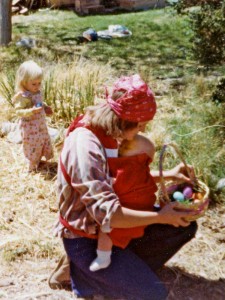Reposted from Mothering Magagine
https://www.mothering.com/community/a/wear-your-baby-the-benefits
Wear Your Baby: The Benefits
Babywearing is a necessity for women all over the world who carry their babies while they work and do domestic tasks. This practice has been around for centuries, but has seen a dramatic resurgence in popularity in recent years. Why? Because touch is good for us.
THE BENEFITS OF TOUCH
According to a study in Pediatrics, babies who are carried cry less. Babywearing for three hours a day reduced infant crying by 43 percent overall and 54 percent during the evening hours.
A study at Columbia University compared the attachment of babies carried in a baby carrier with babies carried in a car seat. After 13 months, the babies who had been transported in wearable carriers were significantly more attached to their mothers.
According to research at Dr. Tiffany Field’s The Touch Institute, touch therapy has been shown to:
- Facilitate weight gain in preterm infants
- Enhance attentiveness
- Alleviate depressive symptoms
- Reduce pain
- Reduce stress hormones
- Improve immune function
Ashley Montagu was the first to remind us of the power of touch in his 1971 classic, Touching: The Human Significance of the Skin. According to Montagu, touch of infants is important because of their developmental vulnerability:
This intensification of cutaneous stimulations is especially necessary in the human fetus because, contrary to general belief, the period of gestation is not completed when the baby is born. It is only half-completed.
Nils and Jill Bergman’s work advocating “kangaroo care” for premature babies recalls Montagu’s characterization of humans as marsupials. Kangaroo care is continuous or prolonged maternal-infant-skin-to-skin contact (supplemented by father or other attachment figure). Research shows that it improves outcomes for premature babies and the Bergman’s recommend it for both premature and full-term babies.
OXYTOCIN
Touching is not just good for baby. Adults also benefit from oxytocin, the neuropeptide released into the bloodstream during many types of touching. Oxytocin makes us want to touch and cuddle. Its release promotes feelings of devotion, trust and bonding. It lowers our heart rate and blood pressure making us feel more soothed and less stressed.
TYPES OF BABY CARRIERS
Babywearing is a practical solution for moms and dads who can tend to older children, make a meal or straighten up the house, all while carrying the baby. It can be more convenient than a stroller in crowded places such as stores, restaurants and airports. And, some carriers allow for easy and discreet breastfeeding.
While a baby carrier can be as simple as a piece of cloth, there are several varieties of manufactured carriers available today:
Choosing the right baby carrier for you and your baby is a matter of trial and error and has to do with the age of your baby and your own personal preference. Experts recommend a baby carrier that is made of “breathable” fabric, one that does not press baby too tightly against the wearer, and that allows the wearer to see the baby’s face. It helps to try on a variety of carriers to find the best fit. Fortunately, there are babywearing classes in cities all over the country.
Join the Babywearing conversation in our Community. Let us know your favorite carrier or learn about the carriers voted Best of Mothering.
Other Resources: Babywearing International and TheBabyWearer.
Tags: Ashley Montagu, attachment parenting, babywearing, Babywearing International, Columbia University, Dr. Tiffany Field, frame back-packs, oxytocin, Pediatrics, Slings, soft structured carriers,soft unstructured carriers, The Touch Institute, Touching: The Human Significance of the Skin,wraps
This entry was posted on Wednesday, October 10th, 2012 at 12:28 PM and is filed under Babywearing.




